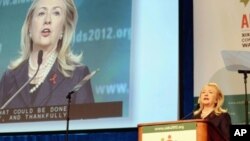For five days in July, some of the most influential people in the global effort to eliminate HIV/AIDS gathered in Washington for the “AIDS 2012” conference. Participants, many of the long-time veterans of the fight against the disease, took stock of the progress they’ve made, and what needs to be done in the future. This year, there was growing optimism among the health professionals and those who fight the disease, that the HIV/AIDS epidemic can be stopped in its tracks. "Hope is taking the place of despair," said U.S. Global AIDS Coordinator Eric Goosby in a June speech at the Brookings Institution, a policy research organization in Washington.
Thirty years after HIV/AIDS was first identified as a virus that kills its victims by undermining their immune systems until their bodies can no longer fight back, the global community has made tremendous progress in addressing the crisis. New HIV infections are at their lowest levels since 1997. Better still, as Secretary of State Hillary Rodham Clinton said last November, “the goal of an AIDS-free generation is ambitious, but it is possible. ... An AIDS-free generation would be one of the greatest gifts the United States could give to our collective future.”
To date, one of the most effective weapons against the disease has been the President's Emergency Plan for AIDS Relief, or PEPFAR. Launched in 2003 by then-President George W. Bush and expanded by President Barack Obama, PEPFAR combines prevention, treatment and care for people affected by HIV and their families.
“It’s almost impossible to overstate America’s contribution,” said Dr. Goosby. “Through PEPFAR as of last year the United States supports nearly 4 million people on treatment. ... [in 2011] PEPFAR’s programs supported drugs to prevent mother-to-child transmission for 660,000 HIV-positive women. Thanks to this effort, an estimated 202,000 infants were born HIV-negative. We also supported HIV testing and counseling for more than 40 million people.”
As President Barack Obama said on World AIDS Day 2011, “We can beat this disease. We can win this fight. We just have to keep at it, today, tomorrow, and every day until we get to zero. ... We’ve come so far and we’ve saved so many lives, we might as well finish the fight.”
Optimism About Defeating Aids

The global community has made tremendous progress in addressing the crisis.












